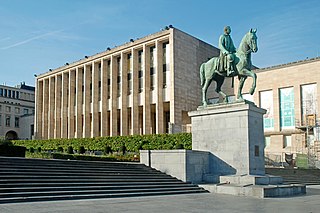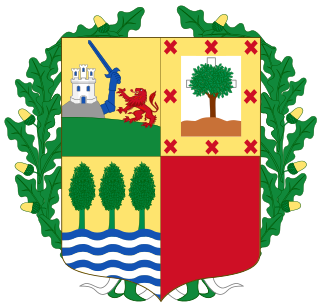External links
- Homepage Archived 2016-02-05 at the Wayback Machine
Eresbil, the Basque music archive, is located in Errenteria (Gipuzkoa, Spain). Its principal aim is the collection, preservation, protection and dissemination of the Basque musical heritage and, especially, the output of Basque composers.
It emerged in 1974 as a result of the need to set the repertory for Musikaste, a week music festival in Renteria devoted to the spreading of Basque composers. Jose Luis Ansorena, within the Andra Mari Choir, the organizer of Musikaste since 1973, took the initiative to create a center to collect the works that could be spread by this festival. The collection of scores of Basque-navarre composers throughout the time began in 1974.
Nowadays, it contains over 200,000 documents, 93,997 of which are audiovisual documents and 74,441 are sheets. Other 16,810 documents complete the collection, including books, magazines and microforms, and also 15,669 copies of varied documentation, such as letters, photographs, programs and posters.
The archive consists of different sections:
The Basques are a Southwestern European ethnic group, characterised by the Basque language, a common culture and shared genetic ancestry to the ancient Vascones and Aquitanians. Basques are indigenous to, and primarily inhabit, an area traditionally known as the Basque Country —a region that is located around the western end of the Pyrenees on the coast of the Bay of Biscay and straddles parts of north-central Spain and south-western France.

The United States Copyright Office (USCO), a part of the Library of Congress, is a United States government body that registers copyright claims, records information about copyright ownership, provides information to the public, and assists Congress and other parts of the government on a wide range of copyright issues. It maintains online records of copyright registration and recorded documents within the copyright catalog, which is used by copyright title researchers who are attempting to clear a chain of title for copyrighted works.

Legal deposit is a legal requirement that a person or group submit copies of their publications to a repository, usually a library. The number of copies required varies from country to country. Typically, the national library is the primary repository of these copies. In some countries there is also a legal deposit requirement placed on the government, and it is required to send copies of documents to publicly accessible libraries.

A national library is a library established by a government as a country's preeminent repository of information. Unlike public libraries, these rarely allow citizens to borrow books. Often, they include numerous rare, valuable, or significant works. A national library is that library which has the duty of collecting and preserving the literature of the nation within and outside the country. Thus, national libraries are those libraries whose community is the nation at large. Examples include the British Library in London, and the Bibliothèque nationale de France in Paris.

The National Library of Ireland is Ireland's national library located in Dublin, in a building designed by Thomas Newenham Deane. The mission of the National Library of Ireland is "To collect, preserve, promote and make accessible the documentary and intellectual record of the life of Ireland and to contribute to the provision of access to the larger universe of recorded knowledge."

The Bibliothèque et Archives nationales du Québec or BAnQ is a Quebec government agency which manages the province's legal deposit system, national archives, and national library. Located at the Grande Bibliothèque in Montreal, the BAnQ was created by the merging of the Bibliothèque nationale du Québec and the Archives nationales du Québec in 2006. The Bibliothèque nationale du Québec had previously merged with the Grande Bibliothèque du Québec in 2002.

The Archaeological Museum of Asturias is housed in the 16th century Benedictine monastery of Saint Vicente in Oviedo, Asturias, Spain. Its findings include collections of the Asturian Neolithic, Megalithic, Bronze Age, Iron Age, Astur hill fort culture, Roman period, and of the Gothic, Pre-Romanesque and Romanesque periods of the Kingdom of Asturias. The museum also includes sections of Asturian Ethnography, Heraldry, Medieval and Modern Epigraphy, Spanish Numismatics, a European Medal Section, and Armor.

The Royal Library of Belgium is the national library of Belgium. The library has a history that goes back to the age of the Dukes of Burgundy. In the second half of the 20th century, a new building was constructed on the Mont des Arts/Kunstberg in central Brussels, near the Central Station. The library owns several collections of historical importance, like the Library of the Dukes of Burgundy, and is the depository for all books ever published in Belgium or abroad by Belgian authors.

The Statute of Autonomy of the Basque Country of 1979, widely known as the Statute of Gernika, is the legal document organizing the political system of the Autonomous Community of the Basque Country' which includes the historical territories of Alava, Biscay and Gipuzkoa. It forms the region into one of the autonomous communities envisioned in the Spanish Constitution of 1978. The Statute was named "Statute of Gernika" after the city of Gernika, where its final form was approved on 29 December 1978. It was ratified by referendum on 25 October 1979, despite the abstention of more than 40% of the electorate. The statute was accepted by the lower house of the Spanish Parliament on November 29 and the Spanish Senate on December 12.

The Gabinetto Scientifico Letterario G. P. Vieusseux, founded in 1819 by Giovan Pietro Vieusseux, a merchant and publisher from Geneva, is a library in Florence, Italy. It played a vital role in linking the culture of Italy with that of other European countries in the 19th century, and also became one of the chief reference points for the Risorgimento movement.

The Répertoire International des Sources Musicales is an international non-profit organization, founded in Paris in 1952, with the aim of comprehensively documenting extant historical sources of music all over the world. It is the largest organization of its kind and the only entity operating globally to document written musical sources. RISM is one of the four bibliographic projects sponsored by the International Musicological Society and the International Association of Music Libraries, Archives and Documentation Centres, the others being Répertoire International de Littérature Musicale, Répertoire international d'iconographie musicale, and Répertoire international de la presse musicale.

The National Library of Bhutan, located in Thimphu, Bhutan, was established in 1967 for the purpose of "preservation and promotion of the rich cultural and religious heritage" of Bhutan. It is located in the Kawajangtsa area of Thimphu, above the Royal Thimphu Golf Course, near the Folk Heritage Museum and the National Institute for Zorig Chusum.

The Biblioteca Nacional de Portugal is the Portuguese national library.

The University Libraries are the academic library system for Bowling Green State University and its regional campuses.
The University of North Texas Libraries is an American academic research library system that serves the constituent colleges and schools of University of North Texas in Denton. The phrase "University of North Texas Libraries" encompasses three aspects: The library collections as a whole and its organizational structure; The physical facilities and digital platform that house the collections; and certain self-contained collections of substantial size that warrant the name "Library"—the Music Library and the Digital Libraries (collections), for example, are housed in Willis Library.

The Grainger Museum is a repository of items documenting the life, career and music of the composer, folklorist, educator and pianist Percy Grainger, located in the grounds of the University of Melbourne, Victoria, Australia.
Musical Documentation Center of Andalusia (CDMA) is an organization created in 1987 by the Ministry of Culture of the Junta de Andalucía to recover, preserve, catalog, classify and disseminate the musical heritage created in or related to Andalusia in all forms.

The Wisconsin Center for Film and Theater Research (WCFTR) is a major archive of motion picture, television, radio, and theater research materials. Located in the headquarters building of the Wisconsin Historical Society in Madison, Wisconsin, the WCFTR holds over three hundred collections from motion picture, television, and theater writers, producers, actors, designers, directors, and production companies. These collections include business records, personal papers, scripts, photographs, promotional graphics, and some twenty thousand films and videotapes of motion picture and television productions.

The Swiss National Sound Archives are the sound archives of Switzerland, based in Lugano. Its mission is to collect sound recordings related to the history and culture of Switzerland, to make them accessible and to make them available for use. In terms of audio recordings, it thus fulfils a similar function to the Swiss National Library in the field of literature. Since 2016, the National Sound Archives have been an organisational part of the Swiss National Library. The collection has more than 500,000 audio carriers and 20-25,000 audio documents are added each year.